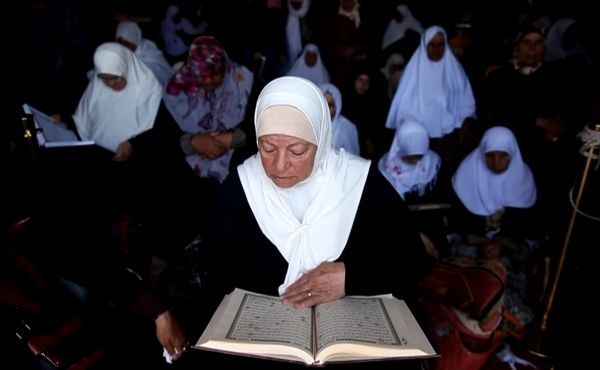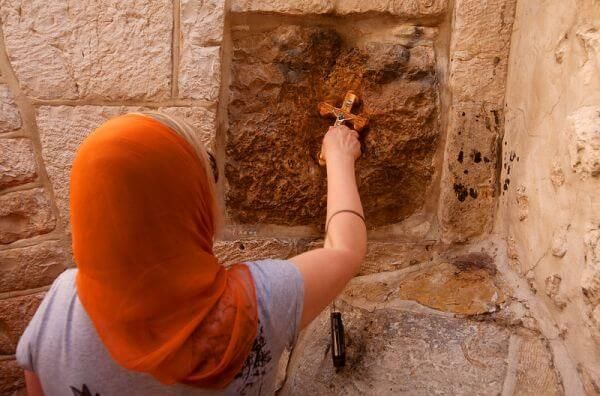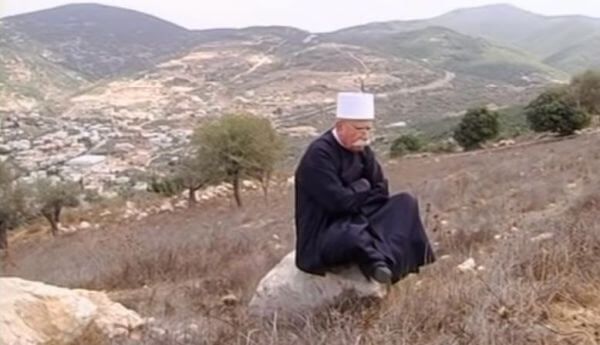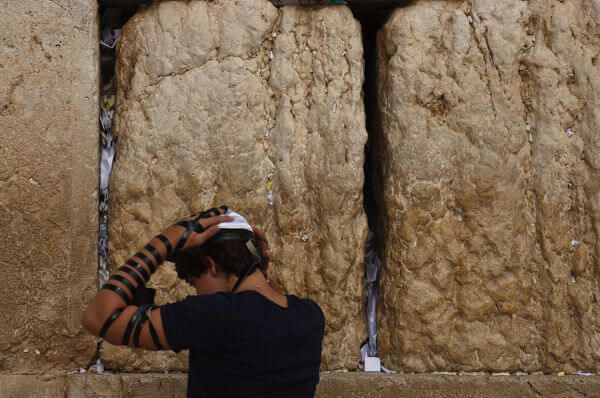“The State of Israel … will guarantee freedom of religion, conscience, language, education and culture; it will safeguard the Holy Places of all religions; and it will be faithful to the principles of the Charter of the United Nations.”
Israel’s Proclamation of Independence, 1948
In 1948 Israel’s founders committed the fledgling country to be a Jewish state, but ensured the free practice of religion for all, regardless of religious affiliation. While Israel does not have a constitution, the Knesset, Israel’s parliament, over the years enacted Basic Laws that protect freedom of religious affiliation and practice.
Israel’s 2019 population of roughly 8.4 million people is 75 percent Jewish, 18% Muslim, 2% Christian, and 1.6% Druze. The remaining four percent includes immigrants from the former USSR, some non-identifying and others who identify as Jewish, but do not meet the Orthodox Jewish definition of “Jewish.” There are also communities of Samaritans, Karaites, Ahmadi Muslims, Baha’is and various small (in Israel) Christian churches. And on the far end of the spectrum, there are even some Pagans and Witches in Israel.
Join the fight for Israel’s fair coverage in the news
Religious Freedom: Government Supported
There are no religious barriers to standing for election to public office and minorities have always been represented in the Knesset. Unlike many western liberal democracies, tax money supports services for religious communities of all faiths. Public money helps support, among other things:
- Operating costs of mosques, synagogues and churches.
- Salaries of community religious leaders.
- Upkeep of numerous holy sites for all religions.
The Ministry of Education funds the school system, including both secular and religious schools – Jewish, Muslim and Christian, as well as some colleges and religious seminaries.
All citizens and guests – the millions of tourists who visit every year – have free and unrestricted access to practice their faith and there is no censorship of sermons. Despite the frosty relations between Israel and the Palestinian Authority, an important area of cooperation between the two sides is tourism and ease of access for tour groups through border crossings, particularly for holy sites on both sides such as Jerusalem, Nazareth, Bethlehem and Jericho.
Like other democracies, the laws of the land also apply, so freedom of religious expression does not include a right to violate the laws governing civil society. In 1992, the Knesset passed the Basic Law on Human Dignity and Liberty, which codified civil and human rights into law. It’s an interesting footnote that this law was passed by a Likud government headed by the late Yitzhak Shamir, and modified in 1994 under a Labor government headed by Yitzhak Rabin that added the emphasis of the freedoms expressly worded in the Proclamation of Independence.

Although the Basic Law on Human Dignity and Liberty refers to Israel as a “Jewish and democratic state,” it is a surprise to many that Israel does not have an official religion. Each of the country’s largest religious communities – Jewish, Muslim, Christian, Druze – has jurisdiction over its internal affairs, religious affairs and personal status, including marriage, divorce and burial. All religious family courts are recognized as autonomous and paid for by the Israeli government.
Every person in Israel enjoys freedom of conscience, of belief, of religion, and of worship. This freedom is guaranteed to every person in every enlightened, democratic regime, and therefore it is guaranteed to every person in Israel. It is one of the fundamental principles upon which the State of Israel is based.
Moshe Landau, Israeli Supreme Court Justice
Points of Contention
With religious freedoms enshrined in law, is Israel a bastion of religious harmony with no contentious issues surrounding the practice of religion? Of course not. Israel, like other democracies, constantly faces a multitude of issues surrounding religious expression.
Israel’s efforts to navigate issues of religious freedom are no different than the experiences of other societies, like in Britain where the leaders of both the major parties have been embroiled in religion-related controversies, or in Canada where the province of Quebec moved to ban the wearing of religious symbols (a step that would be unconscionable in Israel where wearing religious symbols is common practice, be it a Christian wearing a cross or a religious Muslim or Jewish woman both of whom keep their heads covered according to their respective customs).

Among the religious controversies Israel has is the lack of civil marriage. Marriages can only be performed by the respective religious authorities. Primarily a Jewish issue, there is a long-standing accepted workaround where civil marriages conducted outside the country are accepted by Jewish religious authorities. To those not familiar with the arguments involved, it sounds ludicrous, but while this and other problems associated with religion are being fought out in the political arena, Israelis continue to tie the knot both at home and abroad.
Ironically, many of the Israeli couples who decide marry abroad go to nearby Cyprus where foreign marriages are a minor tourist industry. The Israeli newlyweds often bump into lovebirds from neighboring Lebanon, which also has no institution of civil marriage.
Religious Diversity
Israel’s Muslim population consists primarily of approximately 1.4 million Sunni Arabs. Circassians and Bedouins are members of Israel’s Muslim sector. Circassians are a small Sunni Muslim minority, originally from the northern Caucasus, that settled in Israel after being expelled from the Caucasus by Czarist Russia. Like the Druze and Bedouin, Circassian males serve in the Israeli military.
While Christians have been under attack around the Middle East, Israel’s small and very diverse 175,000 Christian community is safely ensconced in a country that protects their religious rights.
As the home to the holiest sites in Christianity, Israel officially recognizes 10 Christian denominations for the purposes of personal status such as marriage and divorce: Greek Orthodox, Greek Catholic, Roman Catholic, Armenian Orthodox, Armenian Catholic, Maronite, Syrian Orthodox, Syrian Catholic, Chaldean Catholic and (Anglican) Episcopal.
The Druze community has a special standing in Israel for its religious tenet of being loyal to the country in which the community resides. Most of the country’s approximately 140,000 Druze live in 22 villages in northern Israel. Like Judaism, Christianity and Islam, Druze faith is monotheistic and Abrahamic, with the Druze revering Jethro, the father-in-law of Moses. The tomb of Jethro, which is known as Nabi Shu’ayb, is located near Tiberias and is one of the most important sites in the Druze faith.

Israel serves as a haven for the Bahá’í, a religious minority that originated in Persia and whose adherents have been routinely persecuted under the Islamic Shia government in Iran. Hundreds of Bahá’í volunteers from around the world reside near the Bahá’í World Centre located in the northern port city of Haifa, where they administer the internal and international affairs of the Bahá’í world community. The staff cares for the Bahá’í holy sites in Israel including Bahjí, where the founder of the Bahá’í faith, Bahá’u’lláh, died in Acre in northern Israel. The beautiful Haifa and Acre centers are UNESCO World Heritage Sites.
Related reading: A Guide to Israel’s UNESCO World Heritage Sites
The Temple Mount
Israeli law mandates that everyone, regardless of religious affiliation, has the right to visit all holy places within Israel. The Protection of Holy Places Law of 1967 states that anyone who attempts to hinder this right or vandalizes a holy site could face criminal prosecution and imprisonment for as much as five years. Exceptions have been made during religious holy days and after terrorist attacks when the government is forced to impose restrictions because of security threats.
By contrast, between 1949 and 1967 when Jordan controlled the holy sites in eastern Jerusalem, Israelis were forbidden from entering East Jerusalem, including the Old City where they had lived until 1949. Under Jordanian rule, holy sites and Jewish cemeteries within East Jerusalem, including the Old City, were desecrated. Upon gaining control of all of Jerusalem in 1967, Israel opened the area to people of all faiths so that they would be free to worship at their respective holy sites without threat of violence or persecution. Israel made this clear in its first radio announcement after capturing East Jerusalem:
This morning, the Israel Defense Forces liberated Jerusalem. We have united Jerusalem, the divided capital of Israel. We have returned to the holiest of our holy places, never to part from it again. To our Arab neighbors we extend, also at this hour – and with added emphasis at this hour – our hand in peace. And to our Christian and Muslim fellow citizens, we solemnly promise full religious freedom and rights. We did not come to Jerusalem for the sake of other peoples’ holy places, and not to interfere with the adherents of other faiths, but in order to safeguard its entirety, and to live there together with others, in unity.
Moshe Dayan; Israeli defense minister, June 7, 1967

Discussion of religious freedoms almost always includes the Old City in Jerusalem, site of the remains of the ancient holy Jewish temples, the Dome of the Rock and the Al-Aqsa Mosque, which are holy to Muslims, and the Church of the Holy Sepulchre, revered by Christians.
For Jews, the Temple Mount is the holiest site in Judaism. Built on the remains of the temple, Islamic tradition states that Muhammad ascended to heaven on the site of the Temple Mount, known as the ‘al-Haram al-Sharif,’ or Noble Sanctuary in Arabic.
Since Israel assumed control of the Jerusalem in 1967, it has worked to maintain the ‘status quo’ on the Temple Mount/Haram al-Sharif area. Given the complex history of the site coupled with the multi-faceted and multi-sided efforts invested, most outside observers trying to understand the myriad of issues are usually left confounded.
Related reading: Jewish Ties to the Temple Mount – What’s the Story?
A couple of illustrative examples show the convoluted nature of the Temple Mount. Firstly, the Muslim holy sites are managed not by Israel or the Palestinians, but by the Jordanian Waqf, an Islamic holy trust based in Amman, Jordan. Secondly, despite freedom of religion, Jews are not allowed to pray on the Temple Mount and those who do risk being arrested. This strange twist comes from both the long standing religious Jewish edict that forbids Jews from going up to the Mount because the requisite ancient ritual purification is not available today, and the Israeli authorities wanting to avoid sparking conflict with the Waqf, which monitors Jewish visits to the area.
* * *
The bottom line seems to be that in practice, despite the stories that grab headlines, there is general respect across Israeli society for religious freedom. In its annual investigations into religious freedom in Israel, the U.S. State Department has over the years reported only minor incidents and no major anti-religious trends either in society or by the government.
In its 2018 annual Report on International Religious Freedom, the State Department stated: “The country’s laws and Supreme Court rulings protect the freedoms of conscience, faith, religion, and worship, regardless of an individual’s religious affiliation.”
Enjoyed reading this article? Follow the Israel In Focus page on Facebook to read more articles explaining Israel’s history, politics, and international affairs. Click here to learn more!
Featured image: via Freepik; Palestinian women via YouTube/AFP news agency; Via Dolorosa CC BY-ND Israel_photo_gallery; Druze elder via YouTube/Israel’s Foreign Affairs Min.; Jewish teen CC BY-SA Montecruz Foto;

